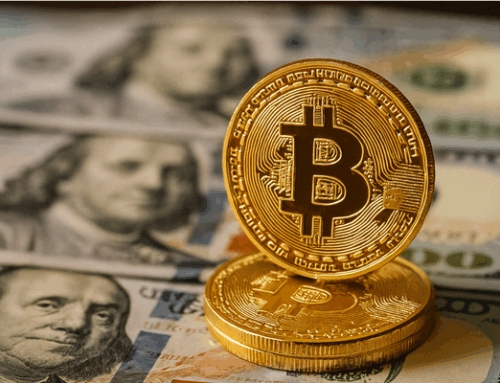Your Bitcoin Could Be ‘Dirty’ — And The Government Is Getting Better At Finding Out
September 19, 2025
Benzinga and Yahoo Finance LLC may earn commission or revenue on some items through the links below.
The cryptocurrency in your digital wallet might carry an invisible criminal history that could land you in legal trouble, even if you bought it legitimately. As federal agencies sharpen their ability to trace digital asset transactions, crypto holders are discovering that owning “dirty” Bitcoin or other cryptocurrencies can trigger asset seizures, frozen wallets, and costly legal battles.
Unlike traditional currency transactions that rarely raise questions about a dollar bill’s origin, digital assets come with a permanent, traceable history that government investigators are increasingly adept at following. This reality is creating new risks for everyday crypto investors who may unknowingly possess assets connected to crimes ranging from money laundering to terrorism financing.
Don’t Miss:
-
Vacancy Rates Below 5% and $2.3B in Unmet Demand — How Everyday Investors Can Access America’s Industrial Boom
-
‘Scrolling To UBI’ — Deloitte’s #1 fastest-growing software company allows users to earn money on their phones. You can invest today for just $0.30/share.
Multiple federal agencies now dedicate significant resources to tracking cryptocurrency transactions.The Office of Foreign Assets Control and the Financial Crimes Enforcement Network have expanded their digital asset investigation capabilities, while recent legislation has armed these agencies with enhanced tools for following the money trail.
The IRS has increased reporting requirements for crypto exchanges beginning with the 2025 tax year, dramatically expanding government visibility into transaction histories. This enhanced oversight means that crypto assets connected to criminal activity are becoming easier to identify and harder to hide.
“Any individual engaging in transactions with such crypto may expose themselves to possible sanctions or enforcement actions,” according to attorneys at Davis+Gilbert LLP who specialize in cryptocurrency compliance issues, Joseph Cioffi, Adam Levy and Christine DeVito wrote commentary in Reuters.
The consequences extend beyond obvious bad actors. Under OFAC guidelines, a “strict liability” legal standard applies, meaning even individuals who unknowingly receive blocked cryptocurrency can face penalties. This includes civil money judgments, information requests, and potential criminal referrals—regardless of criminal intent.
Trending: Kevin O’Leary Says Real Estate’s Been a Smart Bet for 200 Years — This Platform Lets Anyone Tap Into It
The most straightforward example of tainted cryptocurrency involves Bitcoin associated with OFAC’s Specially Designated Nationals and Blocked Persons List. But the contamination can be far more subtle and widespread.
Consider the recent case of United States v. Sterlingov, where the defendant operated Bitcoin Fog, a “mixer” service designed to increase transaction privacy by combining multiple users’ assets. While these services have legitimate uses, this particular platform allegedly became a hub for money laundering activities, according to Reuters.
In 2024, a federal court issued a preliminary forfeiture order covering all assets “involved in” the defendant’s crimes—including lawfully obtained funds in which the defendant never held proprietary interest. This broad interpretation means that innocent third parties who simply used the service could find their assets frozen.
The scope of potentially problematic crypto is staggering. Over the last few years alone, hundreds of billions of dollars in crypto assets have been connected to various crimes and frauds, according to government estimates.
See Also: 7 Million Gamers Already Trust Gameflip With Their Digital Assets — Now You Can Own a Stake in the Platform
Digital asset holders face several specific risks when their cryptocurrency becomes flagged as potentially dirty. Assets can be frozen pending investigation, seized through court forfeiture orders, or suffer devaluation as they become difficult to trade on legitimate exchanges.
Financial Crimes Enforcement Network data reveals that over 37,000 virtual currency kiosks now operate across the U.S as of January—a nearly ten-fold increase from about 4,000 in early 2019, wrote Cioffi, Levy and DeVito. Peer-to-peer transactions and non-compliant exchanges create additional opportunities for unsuspecting buyers to acquire unvetted assets.
Crypto holders who discover their assets have been frozen or forfeited aren’t without recourse, though the path forward can be expensive and uncertain. Third parties can petition federal courts to assert their interest in forfeited property, but this process requires significant time and legal fees with unpredictable outcomes.
More proactive legal strategies might include negligence claims against exchanges with insufficient security measures, or securities fraud claims against platforms that misrepresent their anti-money laundering protocols. Some holders have successfully pursued indemnity claims under user agreements when exchanges fail to properly screen assets.
The most effective approach remains prevention through careful selection of exchanges and counterparties. Investors should prioritize platforms with robust compliance programs and avoid high-risk transaction methods like unregulated peer-to-peer exchanges or privacy services with questionable reputations.
As federal agencies continue expanding their cryptocurrency surveillance capabilities, the risks of unknowingly holding tainted digital assets will likely increase. For crypto investors, understanding these risks and taking appropriate precautions is becoming as important as monitoring market prices and technical analysis.
Read Next: Backed by $300M+ in Assets and Microsoft’s Climate Fund, Farmland LP Opens Vital Farmland III to Accredited Investors
Image: Shutterstock
This article Your Bitcoin Could Be ‘Dirty’ — And The Government Is Getting Better At Finding Out originally appeared on Benzinga.com
Search
RECENT PRESS RELEASES
Related Post



